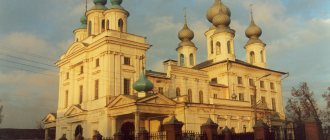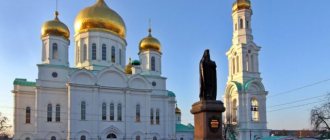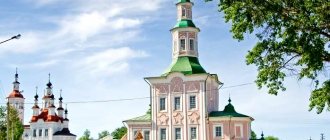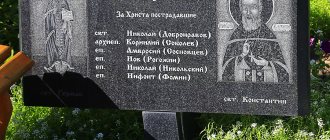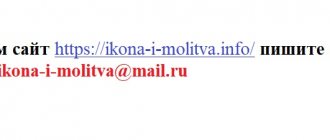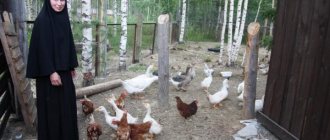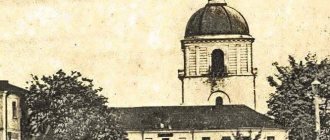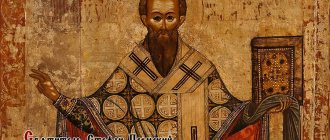| Bishop Mstislav (Dyachina) |
Mstislav (Dyachina)
(born 1967), Bishop of Tikhvin and Lodeynopol, Holy Archimandrite of the Tikhvin Mother of God Assumption and Trinity Alexander Svirsky monasteries In the world, Mikhail Valerianovich Dyachina, was born on November 11, 1967 in Ukraine in the family of the priest Valerian Dyachina (1935 - 2017).
After graduating from school, he served in the army in 1985-1987.
He began his service in the Church as a subdeacon of Archbishop of Pskov and Porkhov Vladimir (Kotlyarov).
In 1988 he entered the Leningrad Theological Seminary, from which he graduated in 1992.
While studying at the St. Petersburg Theological Seminary, he was a reader at the Holy Trinity Cathedral of the Alexander Nevsky Lavra.
In 1996 he graduated from the St. Petersburg Theological Academy and was appointed head of the office of the St. Petersburg diocesan administration.
On March 26, 1998, he was tonsured a monk and named in honor of the blessed Prince Mstislav the Brave of Novgorod.
On April 12, 1998, he was ordained a hierodeacon by Metropolitan of St. Petersburg and Ladoga Vladimir (Kotlyarov), and on December 4 of the same year - a hieromonk.
On July 19, 1999, he was appointed rector of the Nativity of the Virgin Mary of the Konevsky Monastery with the laying of a pectoral cross [1]. On October 6, 2001, he was released from this position due to illness [2].
He was a full-time priest of the St. Nicholas Cathedral of the Epiphany in St. Petersburg.
By Easter 2007 he was elevated to the rank of abbot [3].
In 2007, he was appointed secretary of the St. Petersburg diocese.
| Hegumen Mstislav (Dyachina) |
On October 28, 2011, he was appointed dean of the Lodeynopolsky district of the St. Petersburg diocese and acting rector of the Holy Trinity Alexander Svirsky Monastery in the village of Staraya Sloboda, Lodeynopolsky district, Leningrad region, while retaining the position of secretary of the diocese.
On March 16, 2012, he was confirmed as rector of the Alexander-Svirsky Monastery, and elected Bishop of Lodeynopol, vicar of the St. Petersburg diocese.
On April 1 of the same year, he was elevated to the rank of archimandrite with the presentation of the abbot's staff by Metropolitan Vladimir of St. Petersburg and Ladoga in the Church of the Kazan Icon of the Mother of God in the village of Vyritsa, Gatchina district, Leningrad region.
On April 23, 2012, he was named, and on May 22 of the same year, he was consecrated Bishop of Lodeynopol, vicar of the St. Petersburg diocese. The ordination in the upper church in honor of the Epiphany of the St. Nicholas Naval Cathedral in St. Petersburg was led by Patriarch Kirill (Gundyaev) of Moscow and All Rus'. Concelebrating with him were: Metropolitans of St. Petersburg and Ladoga Vladimir (Kotlyarov), Saransk and Mordovian Barsanuphius (Sudakov), Volokolamsk Hilarion (Alfeev), Eastern American and New York Hilarion (Capral), Tverskoy and Kashinsky Victor (Oleynik); Archbishops of Berlin-Germany and Great Britain Mark (Arndt), Vilna and Lithuania Innocent (Vasiliev), Sebastian Theodosius (Hanna) (Jerusalem Patriarchate); Bishops of Kashira Job (Smakouz), Gatchina Ambrose (Ermakov), Peterhof Markell (Vetrov), Solnechnogorsk Sergius (Chashin), Vyborg Nazarius (Lavrinenko), Yeisk German (Kamalov), Khanty-Mansi and Surgut Pavel (Fokin), Amur and Chegdomyn Nikolay (Ashimov).
On March 7, 2013, he was released from the post of secretary of the St. Petersburg diocesan administration, according to the petition [4].
On March 12, 2013, he was appointed ruling bishop of the newly formed Tikhvin and Lodeynopol diocese [5].
He was the rector of the church in the name of the Holy Blessed Prince Alexander Nevsky in the Constitutional Court (former Senate building) of the city of St. Petersburg and the clergyman of the Cathedral of the Resurrection of Christ (“Savior on Spilled Blood”) in the city of St. Petersburg, relieved of both posts on May 24, 2013 [6] .
On May 5, 2015, he was appointed to the position of abbot and holy archimandrite of the Tikhvin Mother of God Assumption Monastery in the city of Tikhvin, Leningrad Region [7].
On December 27, 2016, he was also approved as the holy archimandrite of the Alexander-Svirsk monastery [8].
Archbishop Mstislav (Volonsevich)
Archbishop Mstislav (in the world Dmitry Ivanovich Volonsevich) was born on November 12 (old style) 1906 in the city of Vilna (Vilnius), in the family of an employee. His childhood and youth years were spent in Volyn, Poland. In 1926 he graduated from high school. In April 1934, he took monastic vows with the name Mstislav at the Dormition Pochaev Lavra and was ordained a hierodeacon. In February 1935, he was ordained a hieromonk and assigned to a parish in the city of Galich. In 1936, Fr. Mstislav graduated from the Theological Faculty of the University of Warsaw. In 1937 he received a master's degree in theology, and in the fall of the same year he was appointed rector of St. George's parish in the city of Lvov and assistant dean of all Eastern Galicia. Since 1938 - abbot of the Yablochinsky Onufrievsky Monastery and assistant to the head of the psalm-deacon courses at the same monastery. Having received the rank of archimandrite, he served for some time at the parish in the village. Girov in Lemkivshchyna (Prikarpattya), then was returned to the Yablochinsky monastery. In the first years of World War II, he was attached to the Warsaw Metropolitanate and served a parish in the town of Zyrardow. In 1944 he was taken to Germany for forced labor. After his release in 1946, he joined the clergy of the Russian Orthodox Church Outside of Russia.
On November 25, 1953, he brought repentance to Patriarch Alexy and in December of the same year he was appointed rector of the church - a monument of Russian glory in the name of St. Alexy of Moscow in the city of Leipzig (then in the German Democratic Republic). In June 1955 he was transferred to the Holy Dormition Kiev-Pechersk Lavra.
On March 4, 1956, in accordance with the determination of His Holiness Patriarch Alexy and the Holy Synod, he was consecrated Bishop of Velikoluksky and Toropetsky. The consecration took place in the Trinity-Sergius Lavra. The rite of consecration was performed by His Holiness Patriarch Alexy, Metropolitan Nestor of Novosibirsk and Bishop Vasily of Sergiopol.
On August 8, 1957, he was installed as Bishop of Sverdlovsk and Irbit. On February 21, 1958, he was moved to the Omsk and Tyumen departments. Since July 27, 1959 - Bishop of Vologda and Cherepovets. Since October 15 of the same year - Bishop of Vologda and Veliky Ustyug. On February 25, 1965, he was elevated to the rank of archbishop.
On May 25, 1965, Archbishop Mstislav was appointed to the Gorky See with the title of Archbishop of Gorky and Arzamas.
In 1964, the leadership of the country changed, and by the grace of God, the plans of the former party leader N.S. Khrushchev for the complete defeat of the Russian Orthodox Church were not destined to come true. The new leadership looked at relations with the Church more soberly, and although atheism still remained the core of communist ideology, the fight against religion lost its former ferocity. The Russian Church had to experience a new stage of existence within an atheistic state. The intensity of the persecution subsided, but there were no fundamental changes in church life. The state took a course towards isolating the Church from society and gradually ousting religious ideas from people’s consciousness. The new Council for Religious Affairs still tightly controlled church activities, but the process of bureaucratization was gaining momentum in the apparatus of the Council and its local representatives.
The Council continued to receive information from Commissioner S. I. Massalkov about the new ruling bishop of the Gorky diocese, as well as about his predecessors in the department. “From the first days of his arrival in the Gorky diocese, the archbishop developed especially great activity in organizing and conducting his episcopal services, and primarily in the churches of the city of Gorky... He tried to give his first services a special solemnity. He conducted services with pathos, conducted church choirs and called on believers to support them with their participation in singing,” the commissioner reported. (We must not forget that these messages reflect the view of the persecutor of the Church, a view that is openly hostile). “The first impression of the new bishop, both among believers and among the clergy, was positive. However, disappointment soon set in, Massalkov continued in his report. - In August and September, the archbishop almost completely stopped his services in churches and began to travel with no less activity to visit the clergy... Along with this, he began to arrange frequent walks by car outside the city and around the city, on a ship along the Volga... During the first visit by the archbishop to the authorized The Council officially informed him that in connection with the reconstruction of the city of Gorky, the City Council on March 14, 1965 decided to build an 80-apartment residential building on the site of the diocesan administration and that therefore the diocesan administration should move to the house at the Karpov Church, where an apartment had been prepared for the bishop and office space. At the same time, he was informed that in connection with the relocation of the diocese on May 9, a representative of the Moscow Patriarchate, lawyer S.I. Filippov, made a special trip to Gorky, who did not express any complaints on this issue. Despite all this, the archbishop, instead of starting the relocation of the diocesan administration, went to Moscow and filed a complaint with the patriarch with a request to have the decision of the Gorky City Council reversed. In mid-June, a representative of the Patriarchate again arrived in Gorky, who, having familiarized himself with the case, tried to convince the archbishop that his claims were unfounded. However, even after this, the bishop did not change his position and tried in every possible way to slow down the relocation of the diocese. At the beginning of July, the archbishop had to be specially summoned and warned that he was behaving incorrectly and disloyally towards the Soviet authorities. After this warning, he stated: “Yes, I really made a mistake, this will not happen again in the future.” In mid-August, the diocesan administration moved to a new location. The bishop no longer expresses any complaints on this issue.”
“Lately,” the commissioner continued to report, “without having clergy personnel in place, the archbishop began to drag people he knew from other dioceses into the Gorky diocese. At the beginning of September, at his invitation, Deacon Krasotkin, who had previously served as a subdeacon with the archbishop, arrived from the Omsk diocese. The bishop appointed Krasotkin a deacon in the cathedral, and a week later ordained him to the priesthood. On September 6, Priest Trinity arrived from the Ryazan diocese and the arrival of Priest Kuznetsov from the Voronezh diocese is expected... For three months, in addition to Moscow, the archbishop traveled to Leningrad for a week in July and to the city of Vladimir for three days in August. Trips to Leningrad and Vladimir were carried out without the knowledge of the Patriarchate... According to the characteristics of the clergy, Archbishop D. I. Volonsevich is an extremely unbalanced person. Today he is cheerful and active, the next day he is overwhelmed by apathy towards everything. Either he is cheerful and kind, or he is rude and annoyingly picky... The purpose of this information is to provide the Council with factual material characterizing the activities of Archbishop Volonsevich.”
Comments, as they say, are unnecessary here. What is striking is the awareness of the commissioner in matters of the activities, service and private life of the ruling bishop of the Gorky diocese, as well as the strict control over this activity, and the virtual lack of rights of local church bodies. And this is not a surprising fact for that time and many subsequent years. Soviet legislation on cults came into direct conflict with church canons, which ordered the bishop to dispose of church property individually (the 38th and 41st apostolic canons) or “with the consent of the presbyters and deacons” (the 25th canon of the Council of Antioch), that is, with the knowledge and consent of the clergy. However, church canons were an empty phrase for the Soviet government; it established its own laws, regardless of anything.
Vladyka Mstislav stayed at the Gorky See for only a short time. A year later, on January 14, 1966, he retired due to illness.
On October 21, 1967, Archbishop Mstislav was appointed to the Kirov See, with the title of Archbishop of Kirov and Slobodsky. In 1977, he celebrated 10 years of service at the Kirov Department. In connection with this date, His Holiness Patriarch Pimen granted His Eminence Mstislav the Order of St. Prince Vladimir, 1st degree.
At the Kirov See, Archbishop Mstislav enjoyed the authority of a strict, but fair and kind mentor and father. Hot-tempered by nature, but easy-going, Vladyka loved his flock, and they treated the archpastor with love and respect.
On March 25, 1978, returning from a trip to Moscow on official business, he felt sick. On April 2 at 9 pm, Vladyka Mstislav peacefully departed to the Lord.
On April 4, 1978, Archbishop Nikolai (Kutepov) of Gorky and Arzamas arrived in Kirov, and was blessed by His Holiness Patriarch Pimen to perform the burial of the deceased hierarch. The coffin with the body of the deceased archpastor was transferred to the Cathedral, where Archbishop Nicholas served the funeral all-night vigil.
On April 5, after the Liturgy of the Presanctified Gifts, the funeral service began with the participation of the city clergy and priests from other parishes. Before the funeral service, Archbishop Nikolai (Kutepov) said a funeral oration in which he asked the flock and clergy to pray for the deceased.
A telegram of condolences was received from His Holiness Patriarch Pimen.
After farewell, the coffin with the body of the deceased hierarch was surrounded around the cathedral while the Irmos “Helper and Patron” were chanted. Then, in the lower church of the St. Seraphim Cathedral in the city of Kirov (Vyatka), Archbishop Nikolai (Kutepov) interred the body of his deceased brother in Christ.
Speech by Archimandrite Mstislav at the naming of Bishop of Velikoluksky and Toropetsky, March 3, 1956
Your Holiness! God-wise archpastors and fathers!
With fear and trembling, I stand, unworthy, before you on this exceptional day of my life: by decree of the Supreme Church Authority, I have been assigned apostolic service in the Church of Christ; I am called to the highest degree of priesthood - to the bishopric.
Understanding the will of God in this, I most humbly bow down and praise the Providential Hand of the Most High, thanking from the bottom of my heart Your Holiness and you, the God-wise bishops of God, who have prophesied such things about me, a sinner.
Feeling with my whole being the commanding voice of God: “Come after Me!”, I go to this call of God and shudder at the thought of how great, responsible, arduous and complex the episcopal service is! What kind of wisdom and strength, meekness and self-control, purity and humility must be had in order to combine just severity in relation to the verbal flock with mercy and condescension towards the flock and show the image of a good shepherd, ready to lay down his life for the sheep (John 10, 11) ! What an answer the bishop bears for the souls entrusted to him before God! How the Rewarder will torture the bishop on the day of His Righteous Retribution!
According to St. Apostle Paul, a bishop must be an example for everyone: in word, life, love, faith, purity (1 Tim. 4:12). He carries out the service of the cross, performs the feat of co-crucifixion with Christ.
The bishop is constantly sick, supervising the shepherds and flock, so that they do not deviate from the true path, and, according to the word of the Apostle Paul, he must say in his heart: “My children, in the image of whom I am sick, until Christ is imagined in you” (Gal. 4, 19). The bishop is the image of Christ, and he must demonstrate the compassionate love of Christ to people.
This is the height to which I, a great sinner, am raised, and fear overwhelms me: how will I bear the greatest feat of episcopacy, before which even such luminaries of the Church as Basil the Great, Gregory the Theologian, John Chrysostom, Athanasius the Great, Cyril of Alexandria and other saints of God were afraid, the bishopric radiant!
My conscience indicates that I, a wretched man, have nothing to boast about, except in my weaknesses. Therefore, I pray to God that through your holy prayers the power of Christ may dwell in me (2 Cor. 12:9).
From the young days of my life, I sought to devote myself to the service of the Holy Church and, having taken monastic vows at the Pochaev Lavra, I thought of remaining there permanently. But the Lord judged differently. I had to experience the many different worries of the sea of life and many sorrows, hardships, insults, human slander and insurance! However, faith in God’s Providence and the mercy of the Creator never left me. The image of the Russian Mother Church was constantly before me. Since childhood, I have kept and constantly warmed in my heart the love for the Motherland. And finally, after a long life abroad, the All-Good Lord brought me out of the prison of trials, and my worldly ship entered my native harbor.
Firmly believing that the Chief Shepherd Christ will give me strength and strength in the upcoming episcopal service, I, unworthy, will sing to the Lord with the words of the Psalmist: “My help comes from the Lord, who made heaven and earth” (Ps. 120:2).
And now my heart is ready, O God, to obey Your Holy Church, “what You have acquired with Your Honest Blood!”
I pray to you, God-wise archpastors, bring down on me the fiery Spirit of Grace, always “healing the weak and replenishing the poor,” which will confirm my right to rule the word of the Truth of Christ.
Amen.
From the book “The Hierarchs of the Nizhny Novgorod Land.” Authors and compilers: Archimandrite Tikhon (Zatekin) and O. V. Degteva. Nizhny Novgorod, 2003.
Vladyka Mstislav: Kyiv is like Jerusalem for us
Today is the Day of Unification of Ukraine, a holiday that has special significance for Ukrainians. After all, conciliarity implies the spiritual unity of people, both in church and in secular life, and this, perhaps, is what we lack so much today. “Community and conciliarity are determined not by national traits, but by faith in God,” says Bishop Mstislav, Bishop of Tikhvin and Lodeynopol. Vladyka was born and raised in Western Ukraine, and is now the vicar of several monasteries in Russia, and on weekends and holidays he serves in St. Isaac's Cathedral and the Church of the Savior on Spilled Blood in St. Petersburg.
“Vladyka, there is now a conflict between our countries. Russians are opposed to Ukrainians, and, on the contrary, we all involuntarily fall into disputes about who is more ancient - Ukrainian or Russian, who is older and who is younger...
— Dostoevsky said wonderfully about this. An Orthodox person is one who believes in Christ regardless of nationality. Yes, everyone understands that Kyiv is the beginning, the spiritual font of Orthodoxy on our lands. 2015 marked the 1000th anniversary of the death of Prince Vladimir. I think this event is an important reminder of our origins, of the beginning of our existence as Christians.
© RIA Novosti, Igor Russak / Go to photobank
Yes, now we are separated geographically, but this is history, politics. When we accepted Orthodoxy, it was all one. I think the root of today's problem is a lack of understanding that the Lord has given us all a test. People living in Russia and Ukraine, in pursuit of external, material things, have forgotten about the main thing - spiritual, internal transformation. That sooner or later we will leave this world and, like pilgrims, we will come to the conclusion that we need to return home.
By our life we determine whether we are with Christ or with worldly passions. Today the struggle for human souls is expressed very harshly. Poison, hatred, and misunderstanding are put into people's hearts. This state is “divide and conquer” and determines the essence of those forces that are trying to destroy faith in Christ. The laws that govern countries largely contradict divine laws and sow deception. It is connected with the confrontation of those forces that fight with God. Therefore, our task is to support our brothers through prayer. When we read the akathist to St. Alexander of Svir in the monastery, it says that he chose the monastic feat because the world for him was the place where joy turned into grief and sorrow. This understanding helps us to sympathize with the troubles that befell the Ukrainian people.
— Do you visit relatives at home?
— I have very few relatives left in Ukraine. Historically, in the 1930s and 1960s, most of my relatives left for Canada and America. I have grandparents and a sister left in Ukraine. I have a very reverent attitude towards family ties, and in order to extinguish the experience, I try to strictly pray for them. After all, many of my friends, former classmates, teachers remained in Ukraine - these people are very valuable to me. I believe and pray that the Lord will not abandon them and will give them that joy, that state of soul that is important for Christians - peace in the heart.
— Do you watch TV, follow the news?
- Yes, I watch TV, listen to the news. It’s not that I’m skeptical about television, newspapers, the Internet, I just understand that any news related to politics is a certain view of certain people. It’s one thing in newspapers or on TV, and another in real life. There are very few media outlets that provide sincere, honest information that would help us understand everything that is happening. And the worst thing happens - people deprive other people of the life given to them by God!
— How to protect yourself from information warfare? How to avoid becoming one of its victims? After all, even we, journalists, are drawn into it, willingly or unwillingly.
- Any person can be defined by his deeds. Faith without works is dead. And if we see that a person says one thing and does another, it means that untruth has crept into his essence.
© RIA Novosti, Alexey Danichev / Go to photobank
— How to understand that this is correct information?
— Through the prism of yourself and the commandments. I think it will help to understand what is happening in your soul when you hear this information. If you have patience and no bitterness, then perhaps this information is more or less fair for you. If anger and even hatred arises, then you should be wary. There are forces and people who are interested in making you hate others. Such information kills you, kills you spiritually. Do you know where the root is? The root is that people stopped communicating with each other, making friends, visiting each other, and stopped going to church. People work a lot, but practically do not communicate at work. In order not to fall into the bait of some kind of information sin in trying to understand who is right and who is wrong, you need to accept only one thing - the Lord is right.
— I heard the phrase that every person goes through his own desert and his own Golgotha. Maybe our country is now going through a desert period?
— When a person comes to God, he feels that the Lord does not leave him, a state of spiritual joy fills his heart. The Lord reveals inner spiritual resources, in which you feel a special heavenly grace in the first moments of communion and communication with the priest. Then the believer begins his path of spiritual improvement. The longer gold sits in the fire, the purer it becomes because the impurities are burned off.
Learning the sacraments of the Church is an Orthodox university in which a person must not just light a candle and read the Lord’s Prayer, but live life. For Ukraine with its great shrines, today a desert has arrived, perhaps even Golgotha. Israeli Jerusalem has always been shaken by the war for shrines. Even the Lord cried, realizing that Jerusalem would one day be destroyed to the ground. We understand that the military actions that are taking place today in the Holy Land in Israel are a struggle for spiritual life, between brothers, because Arabs and Jews are blood brothers. Yes, they have different mothers, but they are blood brothers. I think the same spiritual struggle is happening today in Ukraine. Kyiv is our Jerusalem, the place from which grace came.
— Vladyka, what is it like for you, a native of Ukraine, to serve in St. Petersburg? Is the issue of nationality raised in any way in monasteries?
— In every monastery, regardless of whether it is Russia or Greece, there are Ukrainians. The question of nationality has never interested me. I believe that the issue of nationalism is precisely what brings people together and sows discord. My main question is a question of faith. If you are Orthodox, it means you are a believer; if you are a believer, it means you are with Christ. The Lord will not ask whether you are Ukrainian or Russian, the Lord will ask: why didn’t you save your soul, why didn’t you fulfill the commandments, why aren’t you married, why do you live in fornication, in sin, why don’t you give birth to children...
Only here can we justify ourselves before God, repent and try not to commit sinful acts. Therefore, I don’t see the issue of nationality in monasteries. During Soviet times, many people from Ukraine studied in theological seminaries and academies. I think this was the case both in the 19th century and under Peter the Great. By the way, many metropolitans came from Ukraine, they graduated from the theological academy in Kyiv, and they were accepted as educated bishops and monks. Under Peter the Great, inviting priests from Kyiv was progressive and prestigious.
© RIA Novosti, Igor Russak / Go to photobank
— Is it because Kyiv provided excellent spiritual education?
- Yes. But the main thing is that real warriors of Christ were raised there. Who is a Christian? This is a warrior of Christ who constantly struggles with his passions and weaknesses. It's a constant struggle. It’s worth relaxing a little - drinking or thinking something bad about a person - that’s it, the world has lost. Roughly speaking, you get hit on the head with a frying pan. Peace must be restored through repentance and prayer. And there is no other way.
In this regard, I am very impressed by the governor of the Kiev-Pechersk Lavra, Bishop Pavel. He is emotional, but those you love need to be educated and constantly kept on their toes. Love is not stroking the fur, it is paving the right path. Bishop Pavel and I met at the 300th anniversary of the Alexander Nevsky Lavra. I was impressed as an amazing and kind person who has many spiritual children. He belongs both on Athos and in Jerusalem... He is very generous and loves to help others, he can give everything he has in his pocket. The Lord allowed him - he survived the fire in the Trinity-Sergius Lavra, when the rest died. The Mother of God herself chose him to serve in the Kiev Pechersk Lavra. Today this is a person who, with his strength and capabilities, helps to create in the hearts of people the truth given by Christ, for Christ himself is the truth. And show people the joy that is in Christ.
Anastasia Belousova, Anna Vlasenko
Original publication
Notes[ | ]
- ↑ 123
“We pray for the future of the country and the Church” // Ladya: ethno-confessional almanac of the Leningrad region. 2022. - No. 3 (12). — C. 30 - ↑ 123
News - website of the St. Petersburg Metropolis - Journal of the Moscow Patriarchate No. 8. 2012 Archival copy dated August 13, 2012 on the Wayback Machine
- Definitions of the Holy Synod of June 4 and July 18-19, 1999: Russian Orthodox Church (undefined)
(inaccessible link). Date of access: April 29, 2022. Archived March 4, 2016. - Journal of the meeting of the Holy Synod of October 6, 2001: Russian Orthodox Church (unspecified)
(inaccessible link). Date accessed: April 29, 2022. Archived January 2, 2022. - Patriarchal awards for the holiday of Holy Easter - website of the St. Petersburg Metropolis
- Journals of the meeting of the Holy Synod of March 15-16, 2012. // Patriarchia.Ru
- Abbot Mstislav (Dyachina), elected Bishop of Lodeynopol, vicar of the St. Petersburg diocese, was elevated to the rank of archimandrite (unspecified)
.
Patriarchia.ru
(April 2, 2012). - The naming of Archimandrite Nil (Sychev) as Bishop of Murom, Archimandrite Mstislav (Dyachina) as Bishop of Lodeynopol and Archimandrite Nikita (Ananyev) as Bishop took place. // Patriarchia.Ru
- On the day of remembrance of St. Nicholas the Wonderworker, His Holiness Patriarch Kirill celebrated the Liturgy at the St. Nicholas Naval Cathedral of the Epiphany in St. Petersburg and presided over the consecration of Archimandrite Mstislav. // Patriarchia.Ru
- Metropolitan Hilarion of Volokolamsk met with teachers and students of St. Petersburg Theological Schools // doctorantura.ru, 2012
Courses for newly ordained bishops have ended at the All-Church Postgraduate School // pravoslavie.ru, June 25, 2012
- Journals of the meeting of the Holy Synod of March 12, 2013. // Patriarchia.Ru
- St. Lyudmila (St. MC. Lyudmila, Prince of Czech) Edinoverie parish of St. Petersburg (forming) at the metochion of the Alexander-Svirsky Monastery Moscow Patriarchate - Rector and clergyman
- SAINTANNA.RU | Cavaliers 2nd degree (undefined)
(inaccessible link). Retrieved November 8, 2016. Archived March 28, 2012. - The best people of the city and region were honored in Tikhvin
- At the end of the second day of the Council of Bishops, awards were given to bishops celebrating memorable dates in 2022 / News / Patriarchy.ru
Christmas message 2022 from Bishop of Tikhvin and Lodeynopol Mstislav
Beloved in the Lord, venerable fathers, mother abbess, honest monks and nuns, God-loving laity, dear brothers and sisters!
I cordially congratulate you all on the great and bright Feast of the Nativity of Christ!
The holy Christmas night every year reveals to us the ever-living Divine secret of that night when the Angels first sang: “Glory to God in the highest, and on earth peace, good will toward men” (Luke 2:14). “Let every breath praise the Lord” (Ps. 151:6)! We glorify God, who so loved the world that he gave his only begotten Son, so that whoever believes in him should not perish but have eternal life (John 3:16).
In solitude, far from worldly vanity, fleeting power and empty glory, in a small cave in Bethlehem, God humbly gave Himself to humanity - He Himself became a man. The Creator of the world entrusted Himself to the Most Pure Virgin Mary, entrusted the Mystery of His Birth to the righteous Joseph the Betrothed, to the shepherds and wise men who came from the East. It was they who at that moment had the opportunity not only to experience the great happiness of the Nativity of Christ, but also a great responsibility, when the fate of the Divine Child, the fate of our salvation, was entrusted into their hands - human hands. For our sake, God became human, so that through humility, through our sacrificial love for our neighbor, we would become like Him and imitate His love. There is nothing higher and more important, more joyful and brighter than this on earth.
The great joy of Christ’s birth into the world was accompanied by a great test of faith for those who were close to Him even then. Just like two thousand years ago, this is an immutable truth today. The trial that has befallen the world once again reminds us that human life belongs to God and that salvation in this world also comes from God. And just as Christ believes in a person so much that he entrusts Himself into his hands as a defenseless Baby, so we must respond to this with boundless trust in Christ.
No one will separate us from Him and from His love, “neither death nor life... neither the present nor the future” (Rom. 8:38). Let us ask Christ for help and support so that we have enough faith and fortitude to overcome all the anxieties, difficulties and problems of this world, to be courageous and firm in faith, sincere brothers and sisters, reliable and loving each other. On this holy day of the Nativity of Christ, the day of joy and new aspirations, we will especially pray for our Fatherland, for our families, relatives, people dear to us, near and far, the suffering, the sick and in distress, for the orphaned, the poor, those in prison, widows and orphans, about all those suffering from enmity, strife, violence and oppression. Let us pray and thank God for every day we live and for every person we meet along the path of life.
We thank our clergy for their spiritual feat. Our abbots and abbesses of monasteries for their prayers and works. We thank and pray for our doctors who selflessly serve in hospitals around the clock, saving our lives. We are grateful to the teachers for their moral and pedagogical feats. They are responsible for the education and upbringing of the younger generation. Our children are our future, the future of our Fatherland and the Church.
This holiday rekindles faith, hope and love in us with renewed vigor. After all, the Incarnation is “a great mystery of piety” (1 Tim. 3:16), which opened the way for us to Eternal Life, to the triumph of truth and goodness. Let us turn in prayer to God the Savior and strive to become better, kinder, “...for a Child was born for us” (Is. 9:6). May each of us find the “Bethlehem Cave” and enter it with a contrite heart to find happiness and fullness of life in the arms of the Infant Christ, in communion with God in the Trinity, glorified and worshiped.
Beloved fathers, brothers and sisters in the Lord! Once again I congratulate you on the great holiday of the Nativity of Christ! I wish that your hearts will be warmed with love and warmth, your homes will be filled with goodness, joy and God’s blessing, and in the coming new year the Lord will bestow you with new good achievements, achievements and spiritual victories. May the grace of our Lord Jesus Christ, born of the Ever-Virgin Mary, illuminate your path in life!
God is with us, let us praise Him!
Mstislav
Bishop of Tikhvin and Lodeynopol Christmas Day 2020/2021 Tikhvin
Literature[ | ]
- Naming and consecration of Archimandrite Mstislav (Dyachina) as Bishop of Lodeynopol, vicar of the St. Petersburg diocese // Journal of the Moscow Patriarchate. 2012. - No. 8. - P. 31-33
- “We pray for the future of the country and the Church” // Ladya: ethno-confessional almanac of the Leningrad region. — 2022. — No. 3 (12). — P. 30-33.
- Mstislav (Dyachina) // Orthodox Encyclopedia. - M., 2022. - T. XLVII: “Mor - Murom Monastery in Honor of the Transfiguration of the Lord.” - P. 555. - 752 p. — 39,000 copies. — ISBN 978-5-89572-054-7.
